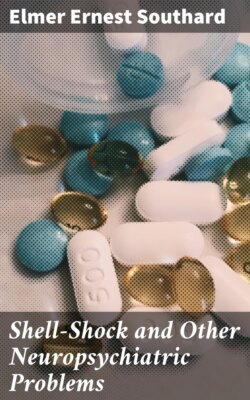Читать книгу Shell-Shock and Other Neuropsychiatric Problems - Elmer Ernest Southard - Страница 108
На сайте Литреса книга снята с продажи.
ОглавлениеLeft-sided hemiplegia and aphasia: Contrecoup and local lesions.
Case 103. (Lhermitte, June, 1916.)
A soldier of 23 was wounded in the left parietal region and showed a left-sided hemiplegia with aphasia. The speech difficulty, although very marked, retrograded almost completely, but the hemiplegia remained severe. This hemiplegia was a spastic one, of a classical nature, with Babinski sign and exaggeration of tendon reflexes. Lhermitte thinks that the left hemisphere was directly affected by the contusion, as in point of fact there was an actual loss of bony tissue, but that it would not be necessary to suppose the ipsilateral hemiplegia was due to an absence of pyramidal decussation. The transient aphasia was probably due to direct affection of the tissues on the left side of the brain; the permanent hemiplegia was doubtless due to a lesion of the opposite hemisphere produced by contrecoup. It appears that sometimes a surgeon may be led to superfluous surgical intervention in a case of such paradoxical hemiplegia, since the surgeon may believe that a bullet or shell fragment has traversed the brain substance to the opposite side of the skull, when as a matter of fact the brain parts have been injured merely by contrecoup.
Re such amnesia, it is of note that many head cases, even if they do not show amnesia, show a conspicuous euphoria and lack of understanding of the seriousness of the injury in question and of the necessary treatment. According to E. Meyer, there are constantly to be found in head cases disturbances of perception and lack of coördination (especially for time), perseveration, difficulty in thinking and calculating.
Chart 5
COMMOTIO CEREBRI
| I. | Senses: Asymmetrical hyp- or anesthesia (with hyperalgesia and osseous hyperesthesia). |
| II. | Motility: Disorder, muscular or reflex. General or unilateral hyperexcitability. |
| III. | Vasomotor Control: Dermatographia. Cardiac, splanchnic disorder; also, Headaches, Vertigo. |
| IV. | Emotions: Disorder. |
| V. | Intake of Ideas: Disorder. Persistent lacunae of memory. |
| VI. | Intelligence: Disorder of recollective memory. Speech-disorder. Intellectual inertia. Overimagination (hallucinations, tremors). |
Mairet, Piéron, Bouzansky.
